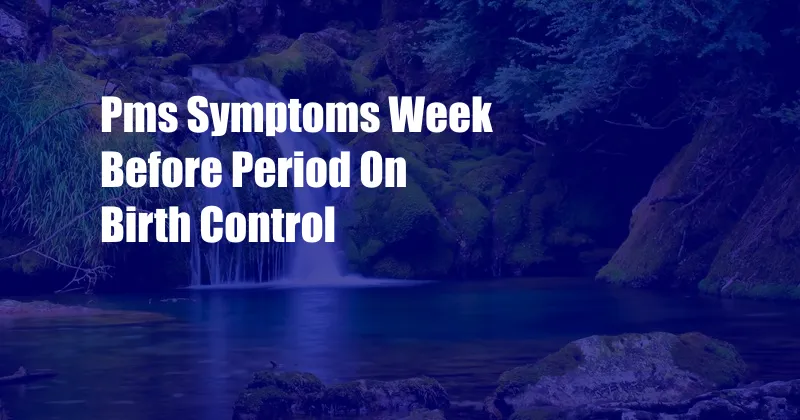
PMS Symptoms Week Before Period on Birth Control
Every month, my mood takes a nosedive a week before my period. I get irrationally irritable, my energy levels plummet, and I crave all the carbs. I’m not alone. Many women experience premenstrual syndrome (PMS) in the days leading up to their period. But what happens when you’re on birth control? Can it still cause PMS?
The answer is yes, birth control can cause PMS symptoms. But it’s important to remember that not all birth control is created equal. Some types of birth control are more likely to cause PMS than others. And even if you’re on a type of birth control that doesn’t typically cause PMS, you may still experience some symptoms.
The Different Types of Birth Control
There are many different types of birth control available, each with its own set of benefits and risks. Some of the most common types of birth control include:
- Oral contraceptives: These are pills that you take every day to prevent pregnancy. They contain hormones that prevent ovulation.
- Intrauterine devices (IUDs): These are small devices that are inserted into the uterus to prevent pregnancy. They can be hormonal or non-hormonal.
- Implants: These are small rods that are inserted under the skin of the upper arm to prevent pregnancy. They release hormones that prevent ovulation.
- Injections: These are shots that you get every few months to prevent pregnancy. They contain hormones that prevent ovulation.
- Barrier methods: These are devices that you use to block sperm from reaching the egg. They include condoms, diaphragms, and cervical caps.
How Birth Control Can Cause PMS
Birth control can cause PMS symptoms in a number of ways. One way is by changing the levels of hormones in your body. Hormones play a role in regulating your mood, energy levels, and appetite. When the levels of these hormones change, it can lead to PMS symptoms.
Another way that birth control can cause PMS is by affecting the way your body produces prostaglandins. Prostaglandins are chemicals that are involved in the process of menstruation. When the levels of prostaglandins are high, it can lead to cramps, bloating, and other PMS symptoms.
Which Types of Birth Control Are More Likely to Cause PMS?
Some types of birth control are more likely to cause PMS than others. These include:
- Oral contraceptives: Oral contraceptives are the most common type of birth control, and they are also the most likely to cause PMS. This is because they contain hormones that can affect the levels of hormones in your body and the way your body produces prostaglandins.
- IUDs: IUDs are another common type of birth control, and they are also more likely to cause PMS than other types of birth control. This is because they can release hormones that can affect the levels of hormones in your body and the way your body produces prostaglandins.
If you are concerned about PMS, you should talk to your doctor about which type of birth control is right for you.
Tips for Managing PMS Symptoms
There are a number of things you can do to manage PMS symptoms, including:
- Exercise: Exercise can help to reduce stress, improve mood, and increase energy levels.
- Eat a healthy diet: Eating a healthy diet can help to reduce bloating and other PMS symptoms.
- Get enough sleep: Getting enough sleep can help to improve mood and reduce fatigue.
- Avoid caffeine and alcohol: Caffeine and alcohol can both worsen PMS symptoms.
- Talk to your doctor: If your PMS symptoms are severe, you should talk to your doctor about treatment options.
Frequently Asked Questions About PMS and Birth Control
Q: Can birth control cause PMS symptoms?
A: Yes, birth control can cause PMS symptoms. This is because birth control can affect the levels of hormones in your body and the way your body produces prostaglandins.
Q: Which types of birth control are more likely to cause PMS?
A: Oral contraceptives and IUDs are more likely to cause PMS than other types of birth control.
Q: What can I do to manage PMS symptoms?
A: There are a number of things you can do to manage PMS symptoms, including exercise, eating a healthy diet, getting enough sleep, avoiding caffeine and alcohol, and talking to your doctor.
Conclusion
PMS is a common condition that can affect women of all ages. If you are experiencing PMS symptoms, you should talk to your doctor about ways to manage your symptoms.
Are you interested in learning more about PMS and birth control?